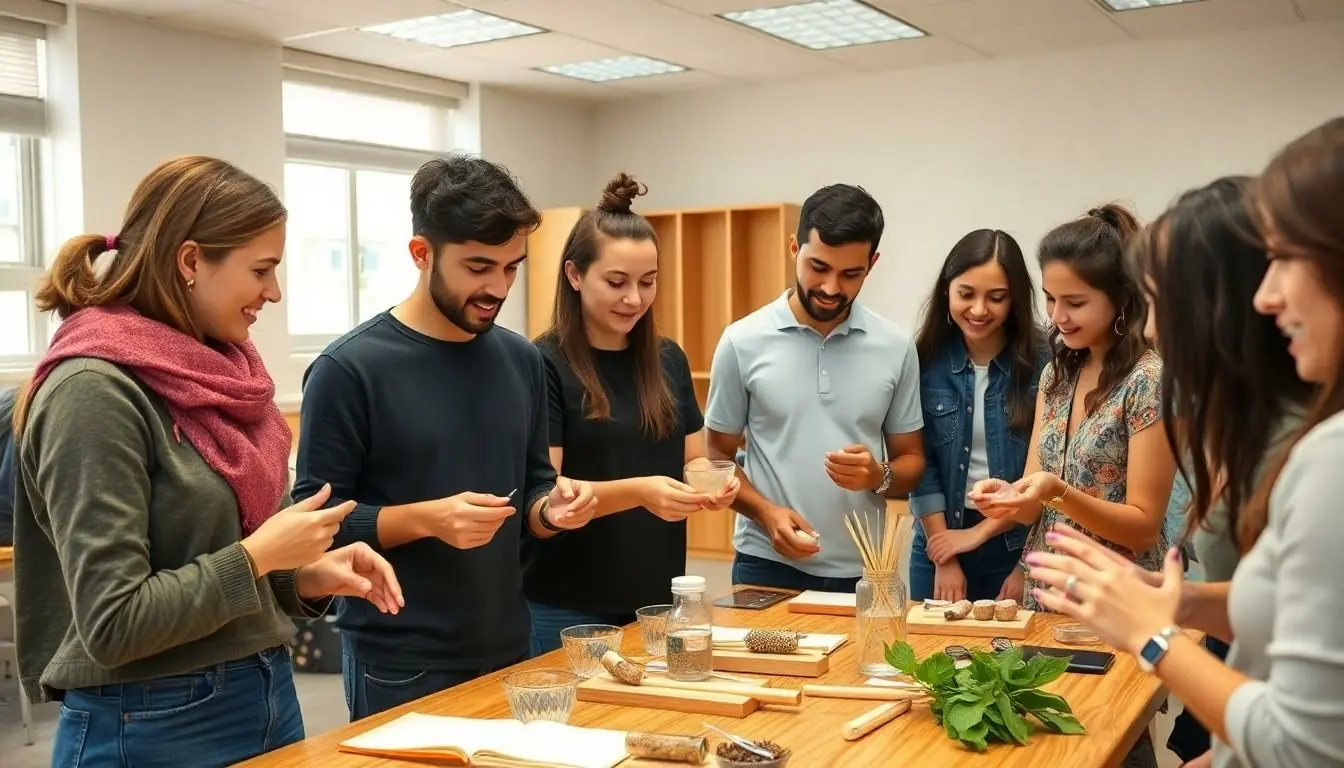In a world where traditional medicine sometimes feels like a game of “guess what’s wrong,” alternative medicine schools are popping up like wildflowers. They’re not just for the hippies with crystals and herbal tea; these institutions offer serious training in holistic health practices that can help heal the body and mind. Imagine learning to balance energies or whip up a healing herbal brew while surrounded by like-minded souls who think the term “conventional wisdom” is just a suggestion.
Table of Contents
ToggleUnderstanding Alternative Medicine
Alternative medicine encompasses a range of holistic health practices distinct from conventional methods. It includes therapies that often emphasize natural healing, patient-centered care, and supporting overall wellness.
Definition and Scope
Alternative medicine refers to healing practices not typically part of conventional medical education. This field comprises various modalities, including acupuncture, herbal medicine, chiropractic care, and meditation. Practitioners often aim to treat the whole person, addressing physical, emotional, and spiritual health. Many schools offer programs covering these diverse approaches, allowing students to explore their unique interests.
Popular Practices in Alternative Medicine
Numerous practices thrive within alternative medicine, each with its distinctive philosophy. Acupuncture involves inserting needles into specific body points to relieve pain and promote healing. Herbal medicine utilizes plant-based remedies for various ailments, highlighting the benefits of nature. Chiropractic care focuses on spinal adjustment to improve overall health and well-being. Additionally, yoga and mindfulness meditation foster stress reduction and enhance mental clarity. Each practice contributes uniquely to the broader spectrum of holistic health approaches.
Types of Alternative Medicine Schools

Alternative medicine schools offer various programs tailored to different learning goals. Understanding these types can help prospective students make informed decisions about their education.
Certificate Programs
Certificate programs in alternative medicine provide focused training in specific modalities. Many schools offer these programs to those seeking quick, specialized education. Topics often include herbal medicine, acupuncture, or massage therapy. Students typically complete these programs within a year. Practical skills benefit from hands-on training, enabling immediate application in professional settings.
Degree Programs
Degree programs in alternative medicine delve deeper into holistic health principles. These programs often range from associate to doctoral degrees, promoting comprehensive knowledge of multiple modalities. Students study subjects such as anatomy, physiology, and nutrition alongside alternative therapies. Many institutions also include clinical experience, allowing students to gain real-world practice. Graduates often pursue careers as practitioners, educators, or researchers in the field, expanding their professional opportunities.
Factors to Consider When Choosing a School
Choosing an alternative medicine school requires careful consideration of multiple factors. Accreditation and reputation significantly influence the quality of education and future opportunities.
Accreditation and Reputation
Accreditation assures that a school meets specific educational standards. An accredited institution provides validated programs that employers respect. Many reputable schools maintain affiliations with recognized organizations in the alternative medicine field. Researching alumni success also reveals insights into the school’s reputation. Reviews from current and former students typically reflect the school’s quality and support. These factors collectively contribute to making an informed decision about the right school.
Curriculum and Specializations
Curriculum depth and available specializations deserve attention in any school selection process. Comprehensive programs usually cover essential topics like anatomy and nutrition alongside alternative therapies. Students benefit from a curriculum that includes practical experience, workshops, and hands-on training. Specializations such as herbal medicine, acupuncture, or massage therapy offer tailored paths for student interests. Prospective students should assess how well the curriculum aligns with their career goals. Choosing a program that provides a strong foundation in the desired specialty can be crucial for future practice.
Local Alternatives: Finding Schools Near You
Finding alternative medicine schools nearby requires some focused effort. Researching options online can yield valuable information about programs.
Researching Online
Start by using search engines to find local alternative medicine schools. Many institutions have online directories that list available programs. Reviews and testimonials from current and former students provide insights into the quality of education. Look for comprehensive information on accreditation, curriculum, and faculty qualifications. Social media platforms and forums can also offer recommendations and experiences shared by alumni. Utilize these resources to compile a list of schools that align with personal interests and aspirations.
Visiting Local Campuses
Visiting local campuses provides a firsthand feel for the environment. Take note of the facilities and infrastructure as they play a significant role in learning. Speaking directly with faculty members allows for questions about program specifics and mentorship opportunities. Attend open houses or information sessions to engage with current students about their experiences. Observing classrooms and laboratories provides insight into the teaching methods used. Personal interactions can significantly influence the decision-making process regarding enrollment in a particular school.
Financial Considerations
Financial aspects play a crucial role in selecting alternative medicine schools. Tuition varies significantly based on program length and institution reputation.
Tuition and Fees
Tuition for certificate programs generally ranges from $5,000 to $20,000, while degree programs can cost between $20,000 and $50,000. Additional fees often include materials, laboratory use, and student services. Depending on the program, certain schools may also charge for clinical experiences. Students must account for these expenses when budgeting for education. Researching individual school websites provides clarity on specific costs and payment structures.
Financial Aid Options
Many alternative medicine schools offer financial aid options, including scholarships, grants, and federal loan programs. Students often qualify based on financial need or academic merit. Working part-time while attending classes can also alleviate financial pressures. Some institutions have financial aid offices that assist students in navigating available funding sources. Understanding eligibility criteria for various financial aid programs sets the foundation for making informed decisions.
Exploring alternative medicine schools opens up a world of possibilities for those seeking a holistic approach to health care. With a variety of programs available students can find the right fit for their interests and career aspirations. The emphasis on practical skills and diverse modalities ensures graduates are well-prepared for their future roles in the field.
As individuals consider their options it’s crucial to research local institutions thoroughly. Evaluating accreditation student reviews and program specifics can lead to informed decisions. Ultimately the journey into alternative medicine not only enriches personal knowledge but also contributes to a growing movement towards comprehensive wellness.





